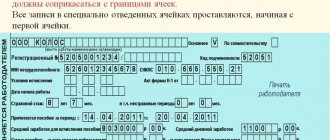Analyst is the collective name of a profession, the essence of which comes down to collecting a large amount of digital data, analyzing it and interpreting the information received. What kind of data this is depends on the specifics of the employee’s work. An analyst may be an expert in finance, investing, specific market segments, engineering, chemistry, computer software, advertising, sociology, and so on. By the way, in 2021, the ProfGid career guidance center developed an accurate career guidance test. He himself will tell you which professions are suitable for you, and give an opinion about your personality type and intelligence.
Features of the profession
Most often, an analyst vacancy involves, in one way or another, working with numbers - the most suitable form of presenting information for conducting research, analysis, identifying statistical principles, forecasting and forming plans for further development. What these numbers mean can apply to almost any area of life in modern society. Although in practice, analysts still more often work in areas related to finance, since they require the most detailed analysis and extremely clear forecasts based on real data and scientific mathematics, and not someone’s intuition.
The key responsibilities of an analyst are reduced to the following sequence of actions:
- Collection of all data necessary for analysis and their primary processing (it is aimed at bringing the data to a unified form, identifying the main features, variables and unknowns for analysis and other preparatory work).
- Determining the main theses of the study, putting forward hypotheses.
- Direct analysis of collected and standardized information, performed using mathematical methods and modern software. As a result of the analysis, the hypotheses are either confirmed or refuted.
- Drawing up forecasts, development plans, projects, methodological recommendations based on the results of the analysis performed.
- Drawing up an analytical report on the results of the analysis, drawing conclusions, and presenting them to the employer/client.
For example, a business analyst can work on the staff of a specific company and study its financial processes, real and potential agreements with partners, and competitors in order to identify its weak and strong points, suggest the best ways to optimize its work, reduce costs and increase profits. A financial analyst may specialize in the specifics of domestic or international market processes. Some analysts specialize in stock trading and can predict the prospects of certain investments.
Analysts working in the field of computer technology improve concepts and methods of software development, advise on information security issues, and help implement more advanced algorithms in practice.
What do analysts do?
The analyst profession is quite common in the IT sector, and still quite a lot of questions arise from the category “Why do you need an analyst?” or “What does an analyst do?” and even “Who is an analyst?” Such questions arise not only among people not involved in software development, but sometimes even within IT companies! I’ve been working as an analyst on various projects for 8 years now, and I can say with confidence that the interpretation of this role in companies and teams may differ, especially if they hired an analyst simply because “it’s necessary”, without understanding his purpose. In this article, I want to combine the standards and my experience to briefly answer these questions. This will be interesting to those who want to understand whether they need such a person on the project and what he should do, as well as to those who have recently entered or are thinking about entering this profession.
Who is an analyst?
For several years now, the IT community has been looking for an answer to this question. Body of knowledge is compiled (see BABOK), standards and competency maps are formed. However, this is more likely to give rise to discussion than to accurately and clearly describe the boundaries of job responsibilities. Any attempt at self-determination of an analyst in professional communities can lead to a long-term dispute on this topic, however, over the years it was still possible to come to some common denominator.
Let's start with the fact that there are quite a lot of analyst positions, and this may limit the range of his tasks. Perhaps, here are the main roles of an analyst in an IT project:
- business analyst,
- Systems Analyst,
- requirements analyst,
- UX designer,
- implementation specialist,
- data analyst,
- management consultant,
- process analyst,
- product owner.
They all have one thing in common: an analyst is a person who is responsible for identifying the needs of stakeholders and reflecting them in a solution that will bring changes to the work of the company.
Our work is well described by the joke: “We are translators from Russian to programming and vice versa.”
What does an analyst do?
On different projects and in different companies, the job responsibilities of an analyst, as we remember, may differ. From experience I can say that most often the functions of an analyst can be reduced to several main points:
- Collecting information from various sources.
- Analysis of this data and verification of reliability.
- Data processing (hypotheses, theses, calculations).
- Developing proposals and strategies to improve the situation.
- Detailing requirements and agreeing them with stakeholders.
- Consultations for other team members.
- Presentation of a ready-made solution.
In some cases (depending on the position, role and project) these functions may become more or less, so I’ll tell you a little about what analysts most often do in our Consortium.
Let's start with the fact that an analyst cannot be on his own; he brings value only within the team:
In our team, among the people directly involved in development, about a quarter are analysts
If we talk about software development, then analysts accompany the entire process of developing a solution: from pre-project examination to transferring the result to users.
The analyst ensures that the solution meets the user's needs
Why do you need an analyst?
From clients and other companies, I often hear the question “Why do we need an analyst at all?” Let's see how the work of a team without analysts and with them differs.
Thanks to analysts:
- The client knows that he is being heard, does not miss any of his thoughts, and understands what will be done. There is no problem that “I thought it was obvious, but you didn’t!”
- The developer knows the expectations of users, he receives understandable answers to questions about necessary improvements
- The tester receives a description of the expected behavior of the product
- The project manager sees the boundaries of the project, work planning is simplified
- for a technical writer to write user documentation, because you know what is implemented and how it should work
It is quite important to look at the work of an analyst through the eyes of a manager:
“Programmers write code that has no value in itself. Software products often add problems to users, do not fit well with existing business processes, and increase time costs. An analyst is able to understand how to connect business needs and technical capabilities, how to make a software product create added value! Ultimately, business needs one thing: increasing profitability. Its increase can be achieved by reducing operating costs and increasing sales while maintaining existing resources. Or, even simpler, by shortening the financial cycle.
The analyst should not focus on the software product, the user interface, data structures or the beauty of the solutions, but should always remember that he is solving the primary business problem - saving time! Time is converted into money, into profit. This problem cannot be solved by a programmer, project manager, designer or tester, but an analyst can!” – Anton Meintser, chief system architect, Codex Consortium.
In short, the most important goal that an analyst should set for himself is to relieve the user’s pain and thereby bring profit to his and his company.
That's what analysts are for.
Anna Mikhailova Head of Data Mining Department, Chief System Analyst, Codex Consortium
2
1
3
0
0
3
Important personal qualities
Obviously, a successful analyst must have extremely pronounced analytical thinking abilities. He must also have a good memory, the ability to maintain concentration for a long time, perseverance, attentiveness, the ability to handle large amounts of information, deduction, induction, responsibility, and observation. Communication skills will also not be superfluous, as will professional intuition (although the analyst must operate with purely provable concepts and conclusions).
Analyst resume sample
An example of an analyst's resume can be found on the Internet, although there are much fewer of them than documents with resumes of accountants or economists. It is possible from a trusted source to leave the formatting of the form, fonts, etc., but it is better to completely erase the information by filling out the fields yourself.
Personal information:
Petrachkov Igor Andreevich, born in 1983, Yekaterinburg. Tel. (XXX)-XXXXXXX, e-mail, VK or Facebook page.
Expected position:
Goal: obtaining a position as a systems analyst, salary - from 80,000 rubles.
Education:
Ural Federal University, specialty "Applied Mathematics", 2000-2006. Languages: English – advanced. Courses: “R” language – 2012
Experience:
Insurance, systems analyst, from 2009 to present. Achievements at work:
- administration of Cisco network equipment;
- Workstation administration;
- building statistical analysis models for Big Data using Teradata;
- reduction due to the analysis of the number of insured events by 7%.
Professional skills and abilities:
- using the R language for data visualization;
- ability to program using XML, JavaScript frameworks, ETL;
- expert in working with Excel, SAS, Minitab;
- the ability to clearly interpret data for reference;
- many years of experience using Oracle and MS Access.
Writing the right analyst resume is quite a challenging task, given the many demands of employers, but the reward in the form of a high salary and other benefits is worth it to thoroughly understand the issue and write the best resume.
Analyst training
An analyst without a higher education cannot apply for good, highly paid positions. On the other hand, domestic universities do not train such specialists “in their pure form,” and the specifics of the work can vary greatly depending on the field of activity. The closest options for training to become an analyst in nature and meaning are the profiles “Economics” (code 38.03.01) and “Sociology” (code 39.03.01). The set of subjects that must be taken for admission depends on the specialty and the university and may include the Russian language, mathematics, social studies and a foreign language. Training in both cases lasts 4 years for full-time students, 5 years for all others.
Courses
ProductStar
In 2 months from scratch, you will master the basics of the Data Analyst profession, understand the specifics and tools - from SQL to searching for insights and data visualization, and understand how suitable the profession is for you. No programming skills are needed, we teach from 0. The most common task of an analyst is collecting data from various sources (from Excel to databases) - for this we use the SQL language, which we will study. Knowledge of the SQL language, experience and the ability to analyze data are enough to qualify for the Junior Analytic position - we will help you properly prepare for this. Graduates receive a certificate of successful completion of the course - which, together with the diploma project, will be a good argument for employment.
ProductStar
An excellent skill for a product manager and marketer - they will teach you not to wait for analysts for small tasks, but to work with SQL yourself to solve typical problems of obtaining and analyzing data. In the course you will learn how to create nested queries and retrieve data from multiple tables. You will be able to work with complex data operations: updating, adding and deleting. Nuances of working with tables. You will understand how to extract, transform and sort data, learn and practice language constructs.
ProductStar
You will master the skills of financial analysis of a team and a company and find multiple growth points. Let's look at it: from Unit economics to P&L and the basics of Growth hacking. You will learn the basics of the P&L approach: We prepare financial reports for the product team and the company in practice and understand the nuances. We use Growth hacking approaches to improve onboarding of new users and increase the current client base. We will study what approaches to monetizing services exist and select the most suitable ones for each phase of product development. We will work on compiling the Unit-economy of your product and find growth points.
ProductStar
With ProductStar you will understand, practice your work skills and learn the nuances of working with one of the most common analytical tools for products - conducting and calculating the results of A/B testing of a product. Middle Product manager vacancies regularly appear on the market from leading companies (with which ProductStar cooperates) - Yandex, Skyeng, Carprice, Tinkoff, Wrike, Selectel, Avito and others. They will help you gain the necessary skills, prepare a resume and get a decent job in a company that interests you.
ProductStar
Master key technologies, learn to work with big data, expand your knowledge in analytics and move to a new level in your profession. You will learn how to write queries, work with data in the database without transferring it to tables, load data and save history, and work with different file formats. You will be able to automate work with large arrays, obtain data from external sources, substantiate conclusions drawn from the data and master the necessary mathematical apparatus for productive work with data models, machine learning and neural networks.
ProductStar
Master key technologies, learn to work with big data, expand your knowledge in analytics and move to a new level in your profession. Tools: from SQL and Python to Hadoop, ETL and DWH. You will learn how to write queries, work with data in the database without transferring it to tables, load data and save history, and work with different file formats. Learn to use Python and data analysis libraries: automate work with large arrays, obtain data from external sources, justify conclusions drawn from data. Master Hadoop and MapReduce. Learn to test hypotheses, learn machine methods for data processing, be able to identify hidden anomalies in data and build predictive models. Master the necessary mathematical apparatus for productive work with data models, machine learning and neural networks.
ProductStar
You will master the profession of Product Analyst from scratch, and will understand in detail all the specifics and tools of this profession, from Google Analytics, Python and BI tools to Machine Learning and DataScience. ProductStar can help you gain the skills you need, build projects for your resume, and find a rewarding job at a company that interests you. Graduates receive a certificate of successful completion of the course - which, together with the diploma project, will be a good argument for employment. 2000+ students have already completed ProductStar courses, you can always ask them for recommendations. There is also a full refund program for the first month of study.
SkillFactory
Learning to work with data analysis tools is an important task for a specialist, regardless of the business area. It is not surprising that the Data Analyst profession is well paid and in demand today. The SkillFactory data school has opened enrollment for the Data Analyst profession. During the training, you will consistently go through all the stages from the basics of data analysis to obtaining a sought-after specialization, as well as hundreds of exercises and practical cases on: 1) databases; 2) SQL; 3) Python; 4) mathematical statistics. And, of course, you will create your first practical projects, which will remain in your portfolio. And in order not to abandon your goal, your tutor will support you throughout the course.
International School of Professions (40 cities of the Russian Federation)
You will learn to work with end-to-end analytics in Yandex.Metrica and Google Analytics, learn to use the SQL and Python programming languages to automate work with information, and be able to visualize large amounts of data in the form of charts, tables and dashboards using Power BI. Based on the results of the exam, a diploma is issued. Possibility of payment in installments. Branches in 40 cities of the Russian Federation. Training in person at a training center or online.
ProductStar
You will understand how to systematize big data using Machine Learning and learn how to work with recommender systems. Master tools such as Python and Hadoop, and also learn the features of the data libraries Pandas, Numpy, Matplotlib, Plotly. Learn the syntax of one of the most popular programming languages, Python, and be able to create and use functions. Learn the key Machine Learning tools and learn how to use them. Learn the types and tasks of recommender systems, and you can also create your own. We’ll also practice working with Hadoop and look at the MapReduce approach.
Universities
Russian State University named after A.N. Kosygina (Technology. Design. Art)
Sociology (Institute of Social Engineering, Russian State University named after A.N. Kosygin (Technology. Design. Art))
Russian State Social University
Sociology (Faculty of Sociology RGSU)
Russian economic school
Economics (Russian Economic School)
Diplomatic Academy of the Ministry of Foreign Affairs of the Russian Federation
World Economy (Faculty of World Economy, Diplomatic Academy of the Ministry of Foreign Affairs of the Russian Federation)
Russian Customs Academy
Economics (Faculty of Economics)
Best Universities for Analysts
- MFUA
- National Research University "Higher School of Economics"
- MASI
- IEAU
- SPbSU
- SPbSUE
- SPbSUE
What knowledge and skills does a data analyst need?
First of all, technical (hard skills):
- Fundamentals of mathematical statistics. There are statistical laws behind many methods of analysis. For correct conclusions, data alone is not enough; you need to use statistics: cut off outliers, correctly calculate the average or median, test statistical hypotheses.
- Ability to create programs for data analysis. The most commonly used programming language in this area is Python. It has a simple and logical syntax, there are many ready-made libraries - so as not to reinvent the wheel, but to assemble a program from already existing functions and blocks.
- Understanding of the principles of operation of relational (tabular) databases. Arrays of information are most often stored in them. To obtain information from such sources, you need to know the SQL language and be able to write database queries in it.
But human qualities (soft skills) also matter. They determine how effective you are as a data analyst and whether you will be comfortable working in such a position. Will come in handy:
- The desire to find the roots of problems. If you really want to understand the causes of events and phenomena, it will be easier and more interesting to study and work.
- Ability to think outside the box. Very strange hypotheses are sometimes confirmed and help companies earn millions.
- Courage. You can doubt your ideas as much as you like, but it’s better to test them with data than to send them to the table, just so that your colleagues don’t think you’re strange.
- The ability to ask the right questions to obtain useful information. This comes with experience.
The course “Profession of Data Analyst” from Yandex.Practicum is an opportunity to master a sought-after specialty from scratch. Try free introductory lessons. They will help you understand how interested you are in data analysis, understand the profession in practice, and try the online learning format.
Take a free trial course
Professional knowledge
- Microeconomics, macroeconomics, international economics.
- Accounting analysis and accounting, tax accounting.
- Econometrics.
- Macroeconomic planning and forecasting.
- Sociological theories.
- Rules for conducting marketing research.
- Sociology of management.
- Sociology of forecasting.
- Higher mathematics.
- Rules for using modern software for research.










